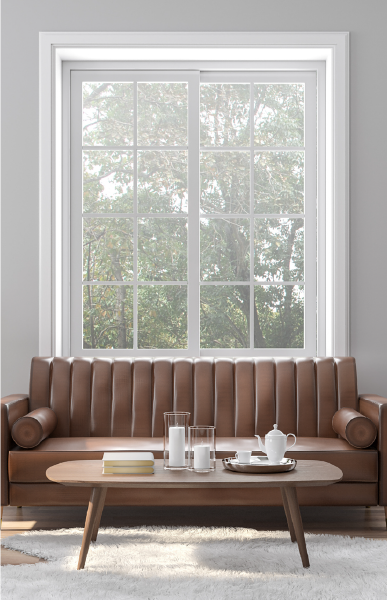First, it was nitrogen in the tires, and now it’s argon in the windows. It all sounds a little space-age, and more than a little confusing. Even if you were stuck memorizing it as one of the elements on the periodic table in high school, it’s more than likely you haven’t run across argon since. So what is argon? What does it do...and
why is it in your windows?
You might hear folks call these kinds of windows “gas fills” or “thermal windows.” It's better living through science—and we’re here to break down why.
What is argon gas?
Before you welcome any kind of chemical into your home, you’re probably going to want to know exactly what it is. Who could blame you?
No worries here—argon is a naturally occurring gaseous element. In fact, it’s one of the “noble gases” on the periodic table, over there in group 18. Two chaps named Lord Rayleigh and Sir William Ramsay discovered it in 1894.
The name argon derives from the Greek word for “idle.” Argon is non-toxic, non-reactive, and non-flammable. That’s a lot of things this gas
isn’t. So why is it found in all kinds of industrial applications, such as lightbulbs, luxury car tires, and scuba diving suits?
The short answer? Argon is dense. It’s much denser than air, and therefore a great insulator. And it’s inexpensive. Score—an inexpensive, natural, dense insulator.
By the way, you may also hear about people using krypton gas to fill their windows. That’s a great option too—albeit a little more expensive. Nice to know that for a bit more extra coin you could have something in common with Superman.
Is this an environmentally friendly idea?
Mother Earth loves insulation. The more insulation we all use in our homes, the less money and resources we need to stay at comfy temperatures all year round.
When you retire your old single-paned windows, it’s smart to invest in
double (or even triple) paned windows. If you upgrade your windows with low-emissivity coated glass and pump the space between the panes with Argon, you’ll have the
most insulated and earth-friendly window out there.
Energy-star, the government organization that helps consumers navigate
energy consumption, independently tests and certifies windows. Their lab experiments have shown that filling your windows with argon improves their u-value (or ability to insulate).
Argon gas-filled windows put the earth’s natural resources to work, utilizing the properties of this element to minimize your carbon footprint and keep your monthly bills low.
How does argon compare with plain old air?
So what’s so bad about our trusty friend's nitrogen and oxygen who constitute most of the air on earth? Take a deep breath. Nice.
Normal air is great, but it’s also filled with moisture. If you trap that moisture-laden air between two panes of glass for a long time, eventually it’s going to start doing some damage to your windows. Over time, your internal window materials break down faster when exposed to oxygen. Those windows will get foggy and leaky.
Argon looks just like normal air to the naked eye, but you are gazing through a much denser gas than oxygen and nitrogen. That density is serving to keep your home insulated.
What else is great about argon?
As a huge bonus, argon gas insulation will actually
block the sun’s UV rays. That means you don’t have to worry about slathering on sunscreen when you want to spend the afternoon sitting by the window reading a book. And your furniture, rugs, and artwork won’t fade sitting in direct sunlight.
If you live on a noisy block, the argon gas-filled windows will also help reduce interior sound. It’s an additional layer of soundproofing between those panes of glass, and an additional layer of comfort the next time the neighbors decide to throw a lively party.
If you went in for those nitrogen-filled tires, you know it can be a pain in the neck to find a place to inflate them. Good news for homeowners: you won’t need to worry about your argon windows needing periodic pumping up. Argon windows lose only about 1% of their gas a year, but the argon will continue doing its job for the full life of the window—well over twenty years.
Window Nation is your solution
Any home, in
any climate, can benefit from the added insulation of argon windows. When you're ready to replace your worn-out windows, argon-filled windows should be at the top of your list. They’re a long-term smart move to keep your family comfortable and your ho
me energy consumption low. Call Window Nation today for an expert consultation.


